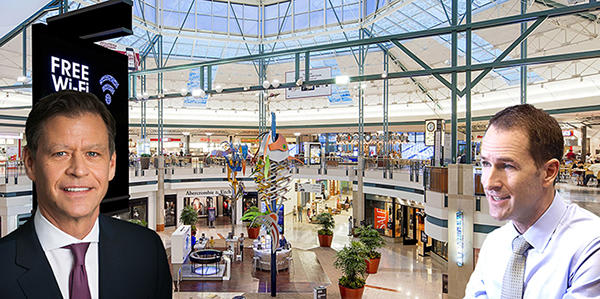
From left: Ric Clark, a GGP mall and Michael Turner
The mall is dead. Or is it?
Brookfield Property Partners is the latest company to double down on retail investment, in spite of falling rents and rising vacancy rates. On Friday, the company’s real estate head Ric Clark explained why. “The headlines in the retail mall space are pretty bad, pretty negative, and frankly we’re pretty excited about it,” Clark said during the Catalyst conference, co-hosted by Honest Buildings and Convene.
He said the Canadian investment giant is currently redeveloping seven malls and removing the roof to turn them into “open-air town centers.”
“We’re high on the retail space,” he added. “We think it will go through a period of meaningful capital investment and repositioning, but we think long-term it will be a good bet for our shareholders.”
Brookfield recently agreed to buy the mall real estate investment trust General Growth Properties for around $15 billion.
Clark also talked about Brookfield’s co-working plans. He said the company considered launching a co-working business, but decided against it. “We think given our scale if anybody could pull off building from scratch a flexible-workspace business on their own, we might be in a position to do it,” Clark said. “But we concluded that’s probably a bad idea.”
Instead, he said, Brookfield plans to partner with co-working companies — or buy one.
Brookfield Asset Management reportedly bid for service office company IWG earlier this year, but a deal never happened.
“I’ve seen some of our competitors in Europe, they’ve tried to build their own coworking business, and I kind of think that it’s a disaster,” he added.
Clark shared the stage with Oxford Properties Group’s president Michael Turner, QuadReal Property Group’s head of special situations Jameson Weber and moderator Adam Doneger, of Cushman & Wakefield, and much of the discussion was about technological change. In January, Berkshire Hathaway, Amazon and JPMorgan Chase announced that they would team up to launch their own health care company. Turner argued that this kind of cooperation between big firms could also happen in real estate tech.
“There may be a few things where we actually see a pain point and a problem, have not been satisfied with a solution in the market and we will start pushing that forward,” he said. “If we think that’s an interesting idea, we’ll probably start talking to people like Ric (Clark) and put some entrepreneurs on it and give it some capital to see if it really has life.”
Weber, meanwhile, said that blockchain technology and crowdfunding could shake up the real estate investment industry. “I think there is a huge desire and source of capital wanting to get to the opportunity more directly with less fees and more discretionary control,” he said. “There’s a huge appetite there.”
